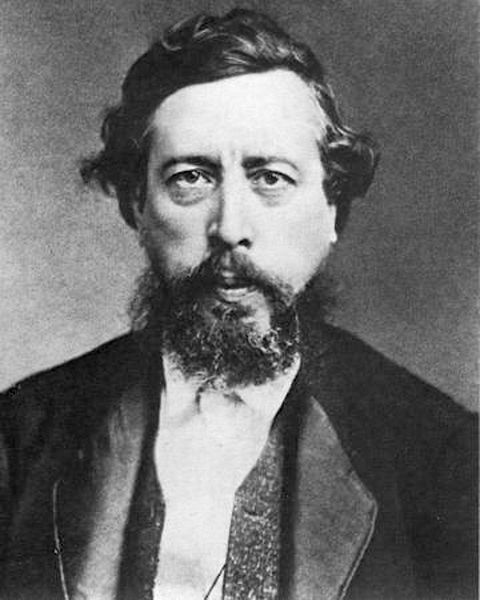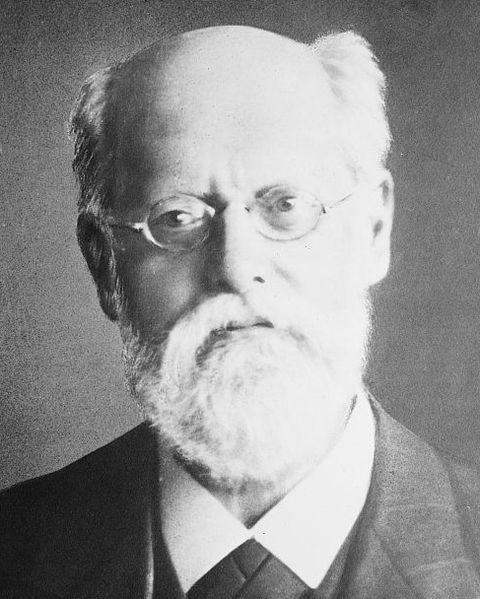<Back to Index>
- Founder of the SPD Wilhelm Martin Philipp Christian Ludwig Liebknecht, 1826
- Philosopher and Political Theorist Karl Johann Kautsky, 1854
PAGE SPONSOR

Wilhelm Martin Philipp Christian Ludwig Liebknecht (29 March 1826 – 7 August 1900) was a German social democrat and one of the principal founders of the SPD. His political career was a pioneering project combining Marxist revolutionary theory with practical, legal political activity. Under his leadership, the SPD grew from a tiny sect to become Germany's largest political party. He was the father of Karl Liebknecht and Theodor Liebknecht.
Born in Gießen as the son of Katharina Elisabeth Henrietta (née Hirsch) and Hessian public official Ludwig Christian Liebknecht, Liebknecht grew up with relatives after the death of his parents in 1832. From 1832 to 1842, he went to school at the Gymnasium of Gießen, then began studying philology, theology and philosophy in Gießen, Berlin and Marburg. After a brush with the authorities as a result of participating in student radicalism, Liebknecht decided to emigrate to the USA.
While on the train, quite by chance, he met the headmaster of a progressive school in Zurich, Switzerland, and Liebknecht impulsively decided to accept an offer to be an unpaid teacher at that school. Thus he found himself in Switzerland in 1847 as a civil war erupted in that country. He reported these events for a German newspaper, the "Mannheimer Abendzeitung", beginning a career in journalism that he would pursue for the following five decades.
When revolution erupted in Paris in February 1848, Liebknecht hurried to the scene. He arrived too late to do much in Paris, but he did join a legion that was heading for Germany to instigate revolution there. In the course of that poorly planned expedition, he was arrested in Baden and charged with treason. On the eve of his trial, revolution erupted once more, and a mob secured his release. He then became a member of the Badische Volkswehr and an adjutant of Gustav von Struve and fought in the ill fated Reichverfassungskämpfe ("federal constitution wars"). After the revolutionaries' defeat, he escaped to Switzerland and became a leading member of the Genfer Arbeiterverein (Worker's Association of Geneva), where he met Friedrich Engels.
In 1850, Liebknecht was arrested for his initiatives to unite Switzerland's German workers' associations, and he was banished from the country. With few options available, like many veterans of the recently failed revolution, he moved his exile to London, where he stayed from 1850 to 1862. There he became a member of the Communist League. During these years, he developed a lifelong friendship and collaboration with Karl Marx. In 1862, after an amnesty for the participants in the revolution of 1848 / 1849, he returned to Germany and became a member of Ferdinand Lassalle's ADAV (Allgemeiner Deutscher Arbeiterverein, "General German Workers' Association"), the precursor of the SPD.
From 1864 to 1865, Liebknecht also worked on the magazine "Der Social - Demokrat" ("the Social Democrat") published by Jean Baptista von Schweitzer; however, he soon found himself in disagreement with the paper's friendly position toward Prussia and its new Minister - President, Otto von Bismarck. So Liebknecht left the editorial staff and was forced to leave the ADAV due to pressure from Schweitzer. After being evicted from Berlin by government authorities, Liebknecht moved to Leipzig, where he met August Bebel, with whom he founded the Sächsische Volkspartei ("Saxon People's Party") in 1867 and the SDAP (Sozialdemokratische Arbeiterpartei Deutschlands, in 1869 in Eisenach. In these years, he was elected to the national legislature, where he conducted a determined but futile opposition to Bismarck's policies. Liebknecht was also the editor of the party organ, "Der Volksstaat" ("the People's State").
In 1870, when the Franco - Prussian War began, Liebknecht used his newspaper to agitate against the war, calling on working men on both sides of the border to unite in overthrowing the ruling class. As a result, he and Bebel were arrested and charged with high treason. It is worth noting that Liebknecht opposed the war regardless of which side started it. His call for revolutionary opposition to the war directly contradicts what his party, the SPD, would do in 1914 when World War I erupted. At that time, with Liebknecht long dead, his successors opted to back the German cause in the war.
In 1872, both Liebknecht and Bebel were convicted and sentenced to two years of Festungshaft ("imprisonment in a fortress"). This was one of sixteen times that Liebknecht's politics resulted in his conviction and incarceration.
After being re-elected into the Reichstag in 1874, Liebknecht played a key role in the merger of the SDAP and Lassalle's ADAV into the SAPD (Sozialistische Arbeiterpartei Deutschlands, "Socialist Workers' Party of Germany") in Gotha in 1875. He also became publisher of the newly founded party organ "Vorwärts" ("forward"), arguing for the integration of Marxist theories into the SAPD's program in his articles.
From 1878 to 1890, the German government outlawed Liebknecht's party, but the terms of the law allowed the party to participate in elections and its elected delegates to participate in the Reichstag. Liebknecht used his position as a Reichstag member to criticize the political situation, and he combated the tendencies in his own party toward anarchism on the one hand and accommodation with Bismarck on the other. Maintaining a radical and unified stance, the SPD emerged from outlawry in 1890 with 20% of the vote in the Reichstag election.
In 1891, Liebknecht became editor - in - chief of "Vorwärts" and one of the originators of the SPD's new Marxist - inspired party platform. Throughout that decade, he continued to serve in the Reichstag and to appear at political conventions of the SPD as a prominent referent. Despite his advanced age, he also was the most prominent leader of the Second Socialist International.
Liebknecht died on 7 August 1900 in Charlottenburg, a suburb of Berlin. 50,000 joined his funeral procession.


Karl Johann Kautsky (October 16, 1854 – October 17, 1938) was a Czech - German philosopher, journalist and Marxist theoretician. Kautsky was recognized as among the most authoritative promulgators of Orthodox Marxism after the death of Friedrich Engels in 1895 until the coming of World War I in 1914 and was called by some the "Pope of Marxism." Following the war, Kautsky was an outspoken critic of the Bolshevik Revolution and its excesses, engaging in polemics with V.I. Lenin and Leon Trotsky on the nature of the Soviet state.
Karl Kautsky, born in Prague to artistic middle class parents, moved with his family to Vienna at the age of seven. He studied history, philosophy and economics at the University of Vienna from 1874, and became a member of the Social Democratic Party of Austria (SPÖ) in 1875. In 1880 he joined a group of German socialists in Zurich who were supported financially by Karl Höchberg, and who smuggled socialist material into the Reich at the time of the Anti - Socialist Laws (1878-). Influenced by Eduard Bernstein, Karl Höchberg's secretary, he became a Marxist and in 1881 visited Marx and Engels in England.
In 1883, Kautsky founded the monthly Die Neue Zeit ("The New Times") in Stuttgart, which became a weekly in 1890. He edited the magazine until September 1917: this gave him a steady income and allowed him to propagate Marxism. From 1885 to 1890 he spent time in London, where he became a close friend of Friedrich Engels. His position as a prominent Marxist theorist was assured in 1888, when Engels put him to the task of editing Marx's sweeping three - volume work, Theories of Surplus Value. In 1891 he co-authored the Erfurt Program of the Social Democratic Party of Germany (SPD) together with August Bebel and Eduard Bernstein.
Following the death of Engels in 1895, Kautsky became one of the most important and influential theoreticians of Marxism, representing the mainstream of the party together with August Bebel, and outlining a Marxist theory of imperialism. When Bernstein attacked the traditional Marxist position of the necessity for revolution in the later 1890s, Kautsky denounced him, arguing that Bernstein's emphasis on the ethical foundations of Socialism opened the road to a call for an alliance with the "progressive" bourgeoisie and a non - class approach.
In 1914, when the German Social - Democrat deputies in the Reichstag voted for war credits, Kautsky (who was not a deputy but attended their meetings) suggested abstaining. Kautsky claimed that Germany was waging a defensive war against the threat of Czarist Russia. However, in June 1915, about ten months after the war had begun and when it had become obvious that this was going to be a sustained, appallingly brutal and costly struggle, he issued an appeal with Eduard Bernstein and Hugo Haase against the pro - war leaders of the SPD and denounced the German government's annexationist aims. In 1917 he left the SPD for the Independent Social Democratic Party of Germany (USPD), which united Socialists who opposed the war.
After the November Revolution in Germany, Kautsky served as under - secretary of State in the Foreign Office in the short lived SPD - USPD revolutionary government and worked at finding documents which proved the war guilt of Imperial Germany.
After 1919 Kautsky's prominence steadily diminished. He visited Georgia in 1920 and wrote a book in 1921 on this Social Democratic country still independent of Bolshevist Russia. In 1920, when the USPD split, he went with a minority of that party back into the SPD. In 1924, at the age of 70, he moved back to Vienna with his family, and remained there until 1938. At the time of Hitler's Anschluss he fled to Czechoslovakia and thence by plane to Amsterdam, where he died in the same year.
Karl Kautsky lived in Berlin - Friedenau for many years; his wife, Luise Kautsky, became a close friend of Rosa Luxemburg, who also lived in Friedenau. A commemorative plaque marks where Kautsky lived at Saarstraße 14.
Vladimir Lenin described Kautsky as a "renegade" in his classic pamphlet "The Proletarian Revolution and the Renegade Kautsky"; Kautsky in turn castigated Lenin in his 1934 work Marxism and Bolshevism: Democracy and Dictatorship:
"The Bolsheviki under Lenin's leadership, however, succeeded in capturing control of the armed forces in Petrograd and later in Moscow and thus laid the foundation for a new dictatorship in place of the old Czarist dictatorship."
Both Lenin and Trotsky, however, defended the Bolshevik Revolution as a legitimate and historic social upheaval akin to the French Revolution, casting themselves and the Bolsheviks unashamedly in the role of the Jacobins, and viewing the "opportunism" of Kautsky and similar figures as a function of "social bribery" rooted in their increasing intimacy with the privileged classes.
Kautsky's work Social Democracy vs. Communism discussed Bolshevist rule in Russia. He saw the Bolsheviks (or Communists) as a conspiratorial organization that had gained power by a coup and initiated revolutionary changes for which there was no economic rationale in Russia. Instead, a bureaucracy - dominated society developed, the miseries of which outweighed the problems of Western capitalism. The attempts undertaken by Stalin to build a working and affluent socialist society failed.
- "Foreign tourists in Russia stand in silent amazement before the gigantic enterprises created there, as they stand before the pyramids, for example. Only seldom does the thought occur to them what enslavement, what lowering of human self esteem was connected with the construction of those gigantic establishments."
- "They extracted the means for the creation of material productive forces by destroying the most essential productive force of all - the laboring man. In the terrible conditions created by the Piatiletka, people rapidly perished. Soviet films, of course, did not show this." (Chapter 6 of Is Soviet Russia A Socialist State?)
- Karl Kautsky died October 17, 1938 in Amsterdam. His son, Benedikt spent seven years in concentration camps, while his wife Luise died in Auschwitz.